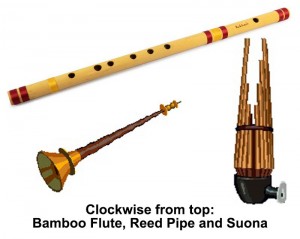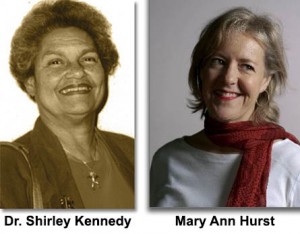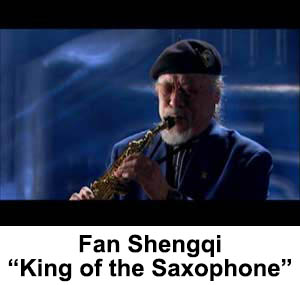The following profile of Chinese octogenarian jazz saxophonist Fan Shengqi is drawn from Eugene Marlow’s forthcoming book Jazz in the Land of the Dragon.
**********************************************
In Blog #61 we reported on 21-year-old Chinese saxophonist Li Gao Yang(李高阳) who was in attendance at the recent April 30, 2013 International Jazz Day event in Istanbul, Turkey—and with the blessing of the Chinese government no less!
Li started learning music at the age of 4. By the tender age of 8 he had already been playing and studying the saxophone. Basically he’s self-taught on the instrument and has become one of the most famous jazz saxophone players, educators and composers of his generation in China.
In stark contrast is Fan Shengqi, whose moniker in China is “King of the Saxophone.” He is now in his eighties. He has been performing music before, during and after Mao.
 Born in 1933, Fan Shengqi picked up the saxophone at age 11. By age 18, Fan Shengqi had become the chief saxophone player of the Chinese Railroad Art Troupe. He had to shelve the saxophone in 1949 as the Communist agenda swept out Western cultural influences. Ironically, he was only allowed to play the saxophone at Chairman Mao’s private dance parties, otherwise focusing on Chinese reed instruments, such as the reed pipe, suona, and bamboo flute.
Born in 1933, Fan Shengqi picked up the saxophone at age 11. By age 18, Fan Shengqi had become the chief saxophone player of the Chinese Railroad Art Troupe. He had to shelve the saxophone in 1949 as the Communist agenda swept out Western cultural influences. Ironically, he was only allowed to play the saxophone at Chairman Mao’s private dance parties, otherwise focusing on Chinese reed instruments, such as the reed pipe, suona, and bamboo flute.
After the reform movement in China following Mao’s death in 1976 and the opening up of China starting in the early 1980s, Fan Shengqi took on the role of band conductor. During this period, he encountered various types of foreign music. This exposure helped to further shape his own taste and performance style. He gradually began incorporating elements of western pop music into some of his own works. He now delights audiences as he seamlessly shifts from the jazz characteristic of the ‘30s and ‘40s to more modern pieces, and back again.
In 1990 after he visited New York, he returned to his homeland determined to delve deeper into jazz and a personal approach to it. By then, jazz had been allowed to return to the public sphere in China. American singer Mary Ann Hurst knew Fan Shengqi during her sojourn to China in the 1980s and in the United States. She reports:
Fan Shengqi started listening to Benny Goodman years ago in China. He had a rough childhood on the Russian-Chinese border, but he was enamored by jazz. He’s one of the people often talked about when people talk about jazz in China.
One of the reasons I know about him is Professor Shirley Kennedy. She was part of the Black Studies Department of the University of California, Santa Barbara (UCSB). She came to Beijing when I was living at Beijing University, and she was looking to do research on Shanghai in Shanghai. She was looking for jazz musicians in Shanghai who had been affected by 1930s black musicians. But she got to Beijing and found there was more jazz in Beijing than there was in Shanghai at that point. And she found out about these various musicians, most of whom were older-world musicians who weren’t playing around a lot, but playing a little bit in some of the hotel lobbies. One of them was Fan Shengqi.
 Hurst recounts that in 1998 Professor Kennedy brought Shengqi to the University of California at Santa Barbara (UCSB), and had a whole symposium built around him. She also brought the late Gene Lees to talk about China. Hurst was on the panel plus a variety of people whom she flew in from all over the country to talk about “Jazz in the World Diaspora.” Fan Shangqi played saxophone with the UCSB Band.
Hurst recounts that in 1998 Professor Kennedy brought Shengqi to the University of California at Santa Barbara (UCSB), and had a whole symposium built around him. She also brought the late Gene Lees to talk about China. Hurst was on the panel plus a variety of people whom she flew in from all over the country to talk about “Jazz in the World Diaspora.” Fan Shangqi played saxophone with the UCSB Band.
Just as Shanghai has its Peace Hotel Jazz Band, Beijing has its own band of senior musicians: “The Old Bark” led, of course, by Fan Shengqi. According to CCTV.com: “One of the more unique features of modern China’s music scene is a jazz renaissance. Chief among the champions of this movement is a band of eight seniors who call themselves ‘The Old Bark.’ . . .The group’s leader, Fan Shengqi is known as ‘King of the Saxophone,’ . . . ”
On the heels of their performance in the 1996 movie “The Temptress Moon,” “The Old Bark” achieved sudden and widespread fame. With his braided hair, striking outfits, and characteristic beret, Fan Shengqi quickly became the icon of the group. Now officially retired, he is actually busier than many people half his age. Between playing tightly-scheduled world tours and recording his own CDs, Fan Shengqi somehow finds time to edit some Chinese classics, such as “Sea Love, Little River Flows,” and “Two Springs Reflect the Moon,” into his own jazz-saxophone style. Some western media have classified his works as “Eastern Jazz.”
Fan Shengqi still lives in Beijing. His wife was the former dancer Wang Jiaqi. They met in Harbin in 1952. He was 19, she was 18. His wife died in 2011 of melamine poisoning, evidently a victim of the Chinese poison milk scandal.
Please write to me at meiienterprises@aol.com if you have any comments on this or any other of my blogs.
Eugene Marlow, Ph.D.
June 3, 2013
© Eugene Marlow 2013


